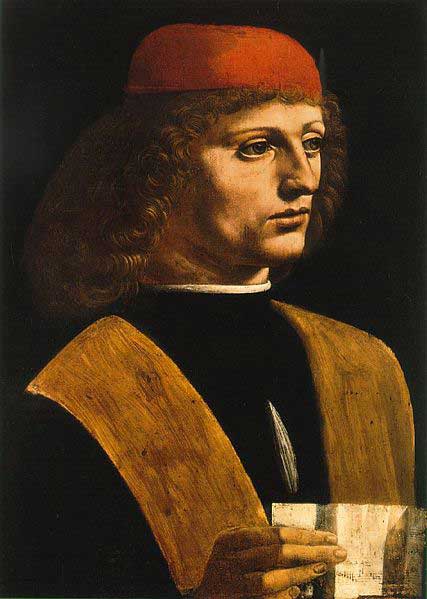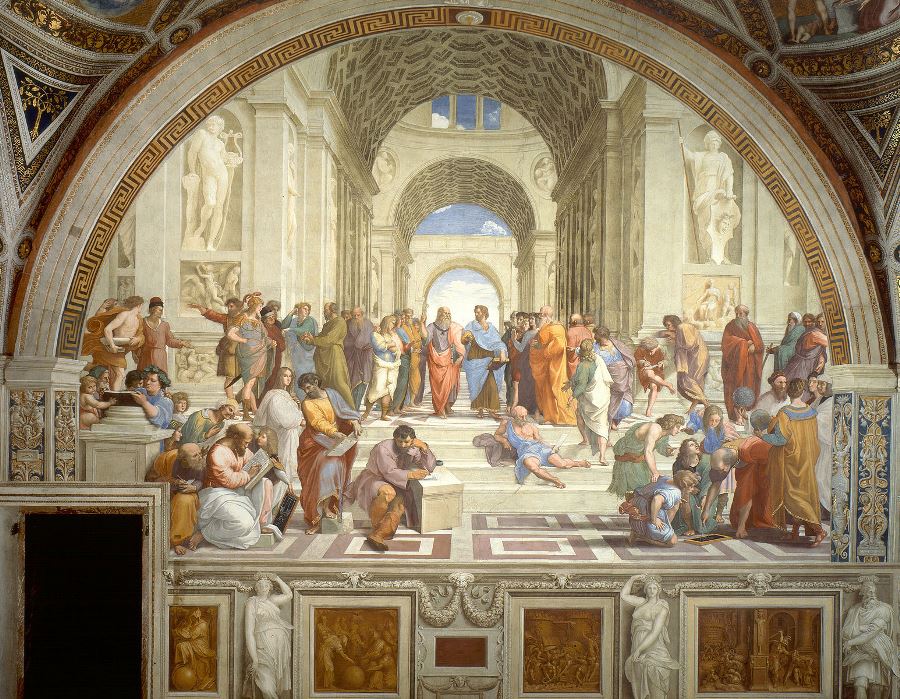エロスのため息 ~恋の形而上学(3)
雨の日の金曜日の午後。 偶然カフェで再会した、アストロロジャー(ビータ)と生徒(シルビー)の対話。人は人を愛する時に、何を求めているのか。相手の中の何を見ているのか。「プラトニック・ラブ」という言葉を生んだ15世紀のプラトン学者マルシリオ・フィチーノの思想と彼のチャートをもとに、2人は愛について語り合う。
ダービー・コステロ著 咲耶まゆみ訳
By Darby Costello Translated by Mayumi Sakuya
English text to follow.
ビ:マルシリオは愛するカバルキャンティにこのように綴っている。
「その昔、親愛なるジオバンニよ、僕はオルフェウス教から愛は存在し、世界全体の鍵を握っていることを学んだ。そして、プラトンからは愛の定義とその性質について学んだ。しかし、この神が与える力や影響力については、僕が34歳になるまでは分からなかった。 34歳の時、ある神聖な英雄が美しい瞳で僕をちらっと見て、美しくうなずいて、いかに愛の力が偉大であるかを見せてくれた。このようにして完全に恋愛事情を知り尽くしたと思った僕は、「愛」についての本を書いたのだった。僕自身の手によって書かれたこの本を君だけに贈ることに決めた。君のものを返すことができるように」
シ:マルシリオはこのカバルカンティを「神聖な英雄」と呼んでいる。7ハウスの獅子座木星・海王星コンジャンクションにぴったりの表現ですね! もちろん、当時はまだ海王星は発見されていなかったから、意識はしてなかっただろうけど。現代惑星の天王星・海王星・冥王星が、「7つの天体のチャート」で示されるマルシリオ・フィッチーノ像を深めているのが興味深いわ。どれも矛盾するストーリーはない。彼は7ハウスに木星があること、そしてそれが「ヨベ(木星のこと)の星のもとに生まれた誰かとの甘い交際」を求める欲求を示していることも知っていた。私たちが知っている海王星で、神秘的な結合への切望、愛する人の理想化、そしてまた幻滅も加わるわね。
ビ:ええ。人生を通して彼が崇拝した人に対して失望は沢山あったわ。でもあまり相手や世の中のせいにしなかったようなの。起こったことは自分の責任としていたようよ。でも、土星について愚痴をこぼしたり、苦労を土星のせいにもしていたようよ。
シ:私もプラトンに対して興味を持ち始めました。マルシリオの変容のプロセスの中でプラトンに没頭したのが分かってきたから。彼が触れていたオルフェウス教についてはあまり知らないのですけど。また、この「プラトニック・ラブ」についても今一つ分からない。彼が望んでいた本当の愛をプラトンへの愛に置き換えたという事なのかしら。もしそうなら、あまり満たされそうもないですね。
ビ:じゃあ、マルシリオがプラトンからエロスと愛について学んだことを教えてあげる。
シ:ああ、エロス。よくよく考えたら、あまりエロスについても知らないわ。ギリシャの神の名前で、ギリシャ語で愛という意味で、「エロティック」という語源になっていることは知っています。そして「エロティック」はセックスという意味ということも!割と単純ではありません?
ビ:ギリシャの言葉ではあるわ、確かに。そして「エロティック」の語源でもある。だけど、プラトンは「セックスの中にある何か」を求めることを意味している。いわば、「性を性たらしめるもの」。プラトンは、それを切り離して、見えるように抽出したと言っていいわ。なぜなら、私たちの時代と同様、プラトンの時代も誤解されていたようだから。プラトンは、道を見失ってしまったと感じた友人や生徒たちに対して、何かを確認したかったんだと思う。セックスに求めている事を誤るとか。セックスを通して彼らが求めているのは、まさしく他の何かであるということを。
私が知る限り、プラトンは、神秘学的宗教からエロスの考え方をとったようよ。このような宗教は、ザグレウス、またはゼウスの息子ディオニソスの神話物語を通して、人間の「世俗的な性質と神聖な性質」の二重の性質を説明している。<中略>
古代ギリシャのオルフェウス教は、浄化とエクスタシーを通して、地の官能的な部分から神聖な要素を解放することを求めたようね。神と再統合できるように。
私たちの中にある神聖な部分から、神そのものを切望することがエロスなの。キリスト教でも、神への切望・思慕の長い歴史がある。(中略)従って、キリスト教の歴史の中でも、マルシリオ以前に、神を切望する伝統があった。ただ、私が知る限り、キリスト教からマルシリオの答えを見つけたのではない。きっと、彼が「饗宴(プラトン作)」の翻訳と、その注釈書「デ・アモーレ」を執筆している時だわ。
このプラトンの「饗宴」の中で、ソクラテスは、若かりし頃に、予言者で巫女であったマンティネイアのディオティマからエロスについて教えられたと述べる。でも、彼女はエロスを神とは呼ばず、ダイモン、つまり守護神と呼んだ。全ての守護神がそうであるように、エロスは神と人の間を行き来してメッセージを伝えたり、あるいは俗世と神の橋渡しをする役割を担った。巫女のディオティマいわく、エロスは、神々がアフロディーテが誕生した日を祝う祝宴を開いている時に生まれた。「豊満(エロスの父)」が寝ている庭園に「貧困(エロスの母)」がやってきて、子供を身ごもる。その子供がエロス。ディオティマは、エロスやラブは、母親のように貧しいために、自分を満たすために常に何かを求める、と語る。しかし、エロスは同時に、父親のように機智に富んでいて賢明でもある。だから、人生から望むものを手に入れることが出来る。そして、エロスが求めるものは、自分が善と美とみなすものを手に入れることで幸せになること。
シ:プラトンは、真善美の3つのイデア(概念)が最高のもので、高い次元にある魂が最終的に求めるものだと言っていたのを思い出しました。
ビ:ええ、そのとおりよ。巫女のディオティマは、こう言っている。「人が恋に落ちるとき、愛する人の美がその人を引き付けるのだ」と。そして「愛する人に礼節と自制をもって接することができれば、目に見える美しさを通して、魂が本当に求めている神性な美を垣間見ることが出来る。一人の人の美を見ることは、他の人の美を見ることにつながる。恋に落ちるとき、魔法にかけられたみたいになって、何もかも輝くようになるわね。 ディオティマはこう語っている。
これは愛の神秘に近づいたり、導かれていくための正しい方法である。まずは、この世の美しさの手本となる者から始まり、さらに彼らを足掛かりに絶対的な美へと上昇し続ける。一人の物理的な美から二人目の物理的な美に続く。そして、二人から全ての人たちへと広がる。そして物理的な美から道徳的な美へ、そして道徳的な美から知識の美へ。そして知識から絶対的な美へと上昇するのだ。
このようなことは、自分と愛する人の中で善を育てていくことでしか出来ないともディオティマは言っている。そして愛が約束を果たすことが出来る唯一の目標だとも。
シ:ということは、その巫女が言っているのは、恋に落ちるときは、気がついていなかったとしても、私は永遠の美を求めているということですか。そして、気が付かないからこそ、まったく相手が美しい振る舞いをしなかったら失望してしまうということですね。正直って、自分が最も美しさからかけ離れた行動をするとき、その失望感が悪化するんです。恋の相手が神聖な何かのスパークを持っていることは分かっていなかった。その恋に落ちている時の状態を保つためには、「良い行い」を保って、自分と相手の善なる部分を養っていかなければならないんですね。
ビ:そんなところね。それで、あなたが抱いていたあの死んだ感覚は?
シ:永遠に相手が美しさを保つことが出来るという、私の幻想が死んだ時の感覚ということですね。
<二人はしばらく座っていると、カフェが混み始めた。雨は止んでいた。しばらくして、シルビーが口を開く>
シ:不思議と穏やかな感じがします。また次の恋が楽しみになってきた気もする。少なくとも、恋愛の大切な事がぼんやり見えてきました。また、この、プラトンを愛読し、「プラトニック・ラブ」という言葉を作ったマルシリオ・フィッチ―ノという男も分かり始めたところです。あの7ハウスの獅子座木星・海王星!この人は、愛する人たちの中に神聖なスパークを探し求めていたんだわ。相手が神に見えたことでしょう。そして、時が影を投げかけていくと、彼も失望していった。土星が牡牛座に入ると、マルシリオは試されたけれども、なんとか通り抜けた。そして、プラトンを理解できたんだわ!
ビ:そのとおり。そしてある時、彼は愛するカバルカンティに手紙を書いているの。
「もちろん、愛(あらゆる哲学者が定義する意味での)は、美を切望することだ。主な美は、物質の影に存在するのではない。光と優美さの中にある形にある。暗闇の中にはない。くっきりと均衡がとれている。意味もなく重く、鈍い物にはない。数や寸法においても調和がとれているものの中にある。だが、その光、優美さ、均衡、数、寸法も、考えたり、見たり、聴いたりすることによって辿り着くのだ。本当の恋人たちの、本当の情熱は、ここまでも導く。しかしながら、相手の物質、質量、重さ、変形に欲求が向くと、それは、愛の美しさと反対にある、愚かで、おぞましく、醜い欲望となる。」
プラトンは官能的、あるいは「通俗的な」エロス、つまり、官能的・性的な満足を求める欲求は認めている。でも、魂の最高の次元にある「神聖な」エロスにもっと価値をみいだしていたようよ。<中略> プラトンは、「饗宴」の中で巫女のディオティマに永遠を求める欲求としてのエロスの両側面を語らせている。俗世的エロスは生殖を目的に男性を女性との性的な交わりへと導く。これは物質的な永遠につながる。神聖なエロスは、男性を心と精神の偉業を達成させるために男性を愛させる。これもまた、別の種の永遠ね。でもこの巫女は、その種の愛が性的な行為によって表されたら、道に迷ってしまい、閉じ込められ、衰弱してしまうと説明してる。
現代女性として、性的な愛は男女間の生殖のみのためにあるという、プラトンの考え方には賛同できない。私は生殖以外にも、セックスによって愛は表現できると、私は思うわ。でも、それが、善であれ、真であれ、美であれ、神聖であれ、不朽であれ、あるいは単純に神であれ、自分と他者の魂が永遠なるものを求める気持ちを大切にしなければ、2人の愛が時間がもたらす崩壊を生き延びる可能性は低いでしょうね。この心の知識 -想像力によって辿り着く現実 -が失われてしまった、このおかしな不道徳な時代、私たちはこの隠れた、永遠の現実が存在するという事を忘れてしまった。 私たちは、欲求を完全に満たしてくれる人さえ見つければ、あるいは、自分を幸せにしてくれる人にとって価値があるような人になるように自分が変わりさえすれば、私たちは幸せになったり、救われたり、解放されたりすると信じようとしている。
シ:本当に興味深かったわ。これからは、金曜日はビーナスの日だってこと、ずっと忘れません。私のチャートの金星と水星はマルシリオの太陽と近い所に配置していました。ヘルメスが私がまた愛の旅を始められるようにこのカフェに案内してくれたんでしょうか?一つ分からないことがあるんです。最初に、マルシリオの愛と苦しみの経験が彼を大きく変容させたとおっしゃいましたよね? という事は、この変容によって愛がもたらす苦しみ全てから彼を解放したということですか?そして、彼が体験したこの「プラトニック―エロティック」な愛は全ての愛の苦しみを解決したということ?
ビ:私たちが知る限り、人生の終盤に深い安らぎは得られたようよ。でも彼はこの安らぎの中に溶け込んでいったようよ。彼は65歳で亡くなったの。
シ:溶け込んだ。。。どういう意味ですか?
ビ:これは、また別の機会にお話した方が良いわね。
シ:そうですね。お開きにしましょう。ここでお話を聞けば聞くほど、質問が浮かんでくるもの。エロティック・ラブの冒険の中にいるときは、善や真は簡単には気が付かないかもしれないけど、マルシリオは自身の変容のために努力したのね。「溶け込んだ」と先生はおっしゃってたけど。。。私が長い間漬かっていた水の世界のような気がする。
マルシリオ・フィッチーノという人のこと考えてみます。そして、今度、美しさと恋に落ちるとき、愛する人の神聖な輝きに注目します。ここれからは善・真・美の考え方に基づいて歩んでいきたいです。でも、どうやっていいか、全く分からないことにも気が付きました。もしかして、長い修行の始まりかしら? 見て、雨が止みましたよ。ひとつか二つ星も見えるわ!
以上
★ダービー・コステロ先生のセミナ-開催します。 詳細・お申込みは、こちら
11月10日(金夜)「木星と土星のトランジット:日常の取り組みの中で見いだす人生の意味」
11月11日(土)12日(日)「星が導く人生の大切なリレーションシップPart①&②」(1日のみの参加OK)
Remembering Eros (3)
A Ficinian Response to Love in the Nineties: A Dialogue between an Astrologer and a Student
V: He wrote to his beloved Cavalcanti:
A long time ago, dear Giovanni, I learned from Orpheus that love existed and that it held the keys to the whole world: then from Plato I learned the definition of love and its nature. But what power and influence this God has, had lain hidden from me until I was thirty-four years old, when a certain divine hero, glancing at me with heavenly eyes, showed me, by a certain wonderful nod how great the power of love is. Being in that way fully informed, as it seems to me, about amatory things, I have composed a book On Love. This book, written in my own hand, I have decided to dedicate exclusively to you, so that I may return to you what belongs to you.’*9
S: He calls this Cavalcanti “divine hero”. What a perfect description of Jupiter conjunct Neptune in Leo in the seventh house!Though of course he wasn’t conscious of Neptune as it hadn’t been discovered yet. It is interesting that each of the modern planets, Uranus, Neptune and Pluto, seem to simply deepen the picture of Ficino shown by the ‘seven planet chart’ – none of them reveal contradictory stories. He knew he had Jupiter in his seventh house and that it indicated his desire for the “sweet fellowship of someone born under Jove”. Our knowledge that Neptune is there adds the note of longing for mystical union and of idealisation of the loved one and also disillusionment too.
V: Yes, and he had much cause for disillusionment in those he idolised during his life, but he didn’t seem to blame others or the world much – he sounds like he took responsibility for what happened to him as he went along, though he does complain about and ‘blame’ Saturn for some of his struggles!
S: And now I’m becoming interested in Plato as I begin to see that his immersion in Plato must have been part of the process of trans-formation for him. I don’t know much about Orpheus, whom he mentions, and I’m still not sure about this Platonic Love. I wonder if vou mean that he substituted his love for Plato for the real love he would have wished for. If so, it doesn’t sound very satisfying.
V: Let me tell you what he learned from Plato about Eros and love.
S: Ah, Eros. Come to think of it I don’t know much, about Eros – I know that it is the name of a Greek God and that it is also the Greek word for love, and that it is the root of the word “erotic”, and erotic means sex! Rather simplistic, I imagine?
V: It is a Greek word, yes, and it is the basis of “erotic” but in Plato it meant that which seeks thesomething within sex, the thing that makes sex sex, so to speak. And Plato, sort of isolated it, brought it out for view, extracted it, we might say, for it appears to have been misunderstood in his time just as it has been in ours. I think Plato was trying to clarify something for his friends and students whom he felt had lost their way; mistaking sex for the thing they were seeking, missing the fact that it was this something else they were seeking through sex.
As far as I know, Plato took the idea of Eros from the Mystery Religions that flourished before him. These regions accounted for the dual nature of man – earthly and divine – by mythologems like that of Zagreus or Dionysus, son of Zeus, who was killed and devoured by the Titans when he was a child. Zeus, in his towering rage, killed the Titans with his thunderbolts, and out of the ashes of their bodies he formed the human race. The myth says that our natures are therefore titanic and earthly, but also divine, through Zagreus, whom they had eaten. The Orphic tradition apparently sought to free the divine element from the earthly sensual part through purification and ecstasy, so that it could be re-united with the Divine. Other religions have had, and still do have, this idea of the dual nature, earthly and divine, and they all work through rituals of one kind or another to find the way to free the divine from the sensual part, so the divine part may find its rightful heavenly home. This longing, from the divine part of ourselves, for the Divine itself, is Eros. Even in Christianity there is a long tradition which addresses this yearning for God. St. Paul, who really constellated the idea of Agape – the notion of the Judeo-Christian God’s love for us – also expressed his own longing for his God. St. Augustine, and even the great medieval scholar, St. Thomas Aquinas, wrote about God in such a way that one can feel the longing he felt for this divine Other. And so, even in the Christian tradition Ficino had a precedent for longing for the Divine. But as far as I know this was not the place where he found the ideas that brought him to his resolution. It must have been when he was translating the Symposium; his whole book, De Amore, is a close commentary on this work.
Now in the Symposium Diotima, the prophetess of Mantinea and his respected teacher, tells Socrates of Eros. However she does not call Eros a god, she calls him a daimon, or as we might say, a spirit. Like all daimons his function is to convey messages back and forth between Gods and men, or to be the bridge between the temporal and the eternal. She says that he was born at a feast that was being celebrated by the Gods on the day of Aphrodite’s birth. In the garden where Resourcefulness was sleeping, Poverty came in and got herself with child by him. That child was Eros. Diotima says that Eros or Love is poor, like his mother and is always in want and longing for something. But he is also resourceful and wise like his father so he can get exactly what he wants from life, and what he wants is to be happy by possessing that which he considers good and beautiful.
S: I remember Plato says that in the realm of Ideas it is the True, the Beautiful and the Good which are the highest, and that which the higher part of the soul is ultimately seeking.
V: Yes, that’s right. Diotima says that when a man falls in love, it is the beauty of the beloved which attracts him. And if he behaves with propriety and self-restraint with the beloved, then the beauty he sees will give him a glimpse of the divine beauty his soul is really seeking. Seeing beauty in one person will lead him to see beauty in another. You know how the state of falling in love seems to cast a sort of spell on you in which everything takes on a glow. Diotima says:
This is the right way of approaching or being initiated into the mysteries of love, to begin with examples of beauty in this world, and using them as steps to ascend continually with that absolute beauty as one’s aim, from one instance of physical beauty to two and from two to all, then from physical beauty to moral beauty, and from moral beauty to the beauty of knowledge, until from knowledge to that absolute beauty.*10
Diotima says you can only do this by nurturing true goodness in yourself and in the beloved and that it is the only goal that can ever make love fulfill its promise.
S: So, what she is saying is that when I fall in love, it is eternal beauty that I am seeking, even if I don’t know it. And then, because I don’t know it, I become disillusioned when the person turns out not to behave beautifully at all – and to be honest, when I see myself behave in a most unbeautiful fashion, the disillusionment gets worse. I had not seen that the person I fell in love with was carrying the spark of something divine. In order to remain in the state I’ve achieved through falling in love, I must maintain “right conduct” and must nurture the good in myself and in the other.
V: Something like that. And the death you are feeling…?
S: .. is the death of the illusion that I might find someone who will remain eternally beautiful.
We sat for a time as the café began to fill. The rain had stopped. After a while, she said, ‘I feel strangely quiet. I think I almost look forward to love again – at least I have the beginning of a glimmer of what it’s all about. And I begin to have some idea of this man, Marsilio Ficino, who read Plato and coined the term Platonic Love. That Jupiter-Neptune in Leo in the seventh house! He was looking for the divine spark in those whom he loved – he must have seen them as gods. And then as time did its darkening work, he too became disillusioned. When Saturn entered Taurus he was put to the test and somehow came through. And then he understood Plato!
V: That’s right. And at some point he wrote this to his beloved Cavalcanti:
Certainly love (as all philosophers define it) is the longing for beauty. The beauty of the body lies not in the shadow of matter, but in the light and grace of form; not in the dark mass. but in clear proportion; not in sluggish and senseless weight, but in harmonious number and measure. But we come to that light. that grace. proportion, number and measure only through thinking, seeing and hearing. It is thus far that the true passion of a true lover extends. However, it is not love when the appetite of the other senses drives us rather towards matter, mass weightand the deformity that is the opposite of beauty or love, but a stupid, gross and ugly lust.”*11
Plato does acknowledge the sensual or “Vulgar” Eros, the desire for sensual or sexual satisfaction, but he seems to place more value on the “Celestial’ Eros which is the higher aspect of the soul. This he considers to be the desire for oneness with the Forms – the real world behind our brief, time-bound, decaying one, and our love of the beautiful here is our love for Pure Forms. In the Symposium he has Diotima discuss both aspects of Eros as the desire for immortality. The Earthly Eros leads men to sexual union with women for the purpose of procreation. This leads to physical immortality. The Heavenly Eros leads men to love men for the purpose of great achievements of mind and spirit, which give another kind of immortality. However, she says that if that kind of love is manifested in sexual acts then we have lost our way and are trapped and drawn downward into decay.
As a modern woman I do not agree with Plato’s ideas about sexual love being about procreation between men and women only. I think that love can be expressed in sexual acts between two people and not only for the purposes of procreation. But I do agree that unless both people cherish their own and the other person’s soul-longing for the immortal realm, whether it be for the Good, the True and the Beautiful, the Divine, the Eternal, or simply God, then their love has little chance of surviving the destruction of time. In these strange, unholy times where the knowledge of the heart – the reality reached by imagination – has been lost, we have forgotten that this hidden, eternal reality exists.We want to believe that all we have to do is to find someone who can gratify us completely and we will be happy/saved/redeemed. Or, all we have to do is change ourself enough so that we will be worthy for someone else to make us happy.
S: Well, this has certainly been interesting. From now on, I shall always remember that Friday is Venus’s day. I notice that in my chart Venus and Mercury are close to Ficino’s Sun – do you think Hermes guided me into this café so that I could begin Love’s journey again? One thing puzzles me, though. You said, at the beginning of our conversation, that his experience of love and its pain led him to a profound transformation. Were you saying that this transformation freed him of all the pain that love can bring? That this “Platonic-Erotic” love he experienced resolved all love’s pain?
V: Ah, well from everything we know, he did achieve a profound peace at the end of his life. But by then – he was 65 when he died -it seems he had burned through to this peace…
S: Burned through…what do you mean?
V: I think perhaps this is the beginning of another conversation.
S: Yes, you are right, it is time to stop. The longer I sit here the more questions begin to arise. The Good and the True might not be so easily perceived when one is on the high sea of erotic love, and yet this is what Ficino worked with to facilitate his own transformation. “Burned through”, you said… I sense, but cannot imagine, the worlds beneath the waters I have been immersed in for so long.
For now I shall think about this man, Marsilio Ficino, and the next time I fail in love with beauty I shall try to keep my eye on the divine spark that I see in the one who becomes my Beloved. At this moment my desire is to navigate by the idea of the Good, the True and the Beautiful. I begin to realize I might not know how to do this at all. I suddenly wonder have I just stepped through the door here, into a very long apprenticeship? Look, it’s cleared outside – I can even see a star or two!
End.
*9. M. Ficino, De Amore Op. cit. Appendix. No. I. This letter prefaced the holograph copy of De Amore
*10. Plato. The Symposium ,(Harmondsworth, Middlesex, 1951), 94
*11. M Ficino, Letters” Vol.). No.47
★Click here for details of Darby Costello‘s Tokyo seminar on 2017 10th(Fri. evening), 11th (Sat) and 12th(Sun).
関連記事
Submit your review | |




